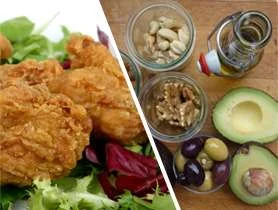
The assertion that all calories are the same is incorrect; however, nutritional science struggles to explain the phenomenon and attributes different explanations to the findings. The explanation is more simplistic than one might think, and it has to do with the different routing of various types of foods; age and health status are crucial in food routing, which affects the body's energy balance. As we know, calories cannot be created or destroyed, but they can be counted in different ways.
The concept of negative calories is a completely different approach.
The concept of negative calories is not new; it typically refers to foods that require more energy for digestion than they contain. My hypothesis is entirely different.
- The new trend of slimming by testing intestinal bacteria and adapting foods accordingly is based on similar principles, including the improved absorption of nutrients suitable for tissue regeneration and long-term maintenance. (Without a comprehensive theory to explain how it works).
Digestion of food is just one of a series of processes that require energy for regular consumption. (Such as maintaining body heat) We usually eat and drink various foods together. Therefore, this approach to the energy invested in digesting food and beverages is impractical.
Surprisingly, processed foods cause us to gain weight much faster than the same number of calories in natural foods.
The nutrients we eat and drink, and the calories they carry, cannot vanish, but they can be redirected to other non-energy, "non-countable" purposes.
Link: Advanced Nutrition Calculations Methodology.
- The portion of food dedicated to tissue regeneration varies depending on the body's requirements, as well as the quality and quantity of the diet. The rest is converted into energy and stored as fat, influencing body weight. Surprisingly! Processed foods tend to cause weight gain more quickly than natural foods, which contain the same number of calories. Not all calories are equal.
- When you refuel your car, you know exactly how much energy you will get (in terms of driving range).
Since food routing between the two primary uses (tissue building and maintenance, as opposed to available energy and fat accumulation) is not fixed and differs from person to person, summarising the calories in food and beverages is inaccurate.
The caloric count also depends on gender.
Differences in nutrient breakdown efficiency were found between women and men. After fasting, men tend to digest carbohydrates more efficiently than women, who tend to digest fats more efficiently. The study found that women's and men's responses to the same calorie count varied between different foods.
The article was published in the journal Computers in Biology and Medicine
- These conclusions support the hypothesis presented in this article, which is that not all calories are the same. Caloric calculations vary among individuals and differ between men and women.
- Women have a higher percentage of fat relative to weight than men. It is assumed to be due to the need to allow women to carry a pregnancy and breastfeed, even under conditions of scarce food. Thus, women who want to optimize their weight should eat more fatty foods, which are also dense and have a smaller volume than carbohydrates.
- Men have an advantage in breaking down carbohydrates and starchy foods more efficiently. These foods break down faster into energy, allowing for intense physical activity that is more typical of men.
What about protein breakdown?
- The study does not discuss this issue, but I assume no conclusive findings will be found. It requires a higher resolution. Women have a distinct advantage in restoring internal tissues (reflected in a longer average life expectancy), while men have an advantage in rapidly building muscles and joints.
To illustrate the principle, let's consider, for example, a fresh vegetable salad with vinegar, lemon, and a generous amount of olive oil.
- The oil lubricates the intestinal walls, and the dietary fiber in the salad helps renew them in the presence of probiotic bacteria. The many calories found in oil have not disappeared! (Energy conservation laws do not allow energy and matter to disappear.) But have changed shape and become tissue. The result is that less food is converted into available energy and/or accumulation of fatty tissue. The effect is even more significant because the intestinal walls that allow for the absorption of nutrients also enable the liver to synthesize more proteins and fats for tissue renewal in various other parts of the body.
- It is sufficient to create a 5% rerouting of the food you consume for purposes other than energy, allowing your body weight to decrease over time, and with it, your health will improve.
Continue reading: Calories cannot disappear, but can be redirected as being uncounted.

The amount of energy in food and beverages available for the body's use is not fixed and is not uniform for everyone! The "calorie is a calorie" tautology is wrong.

